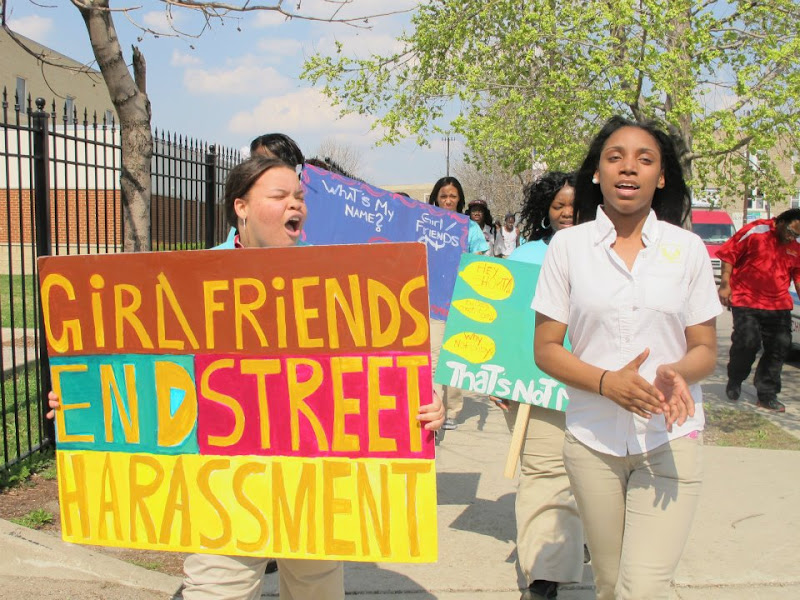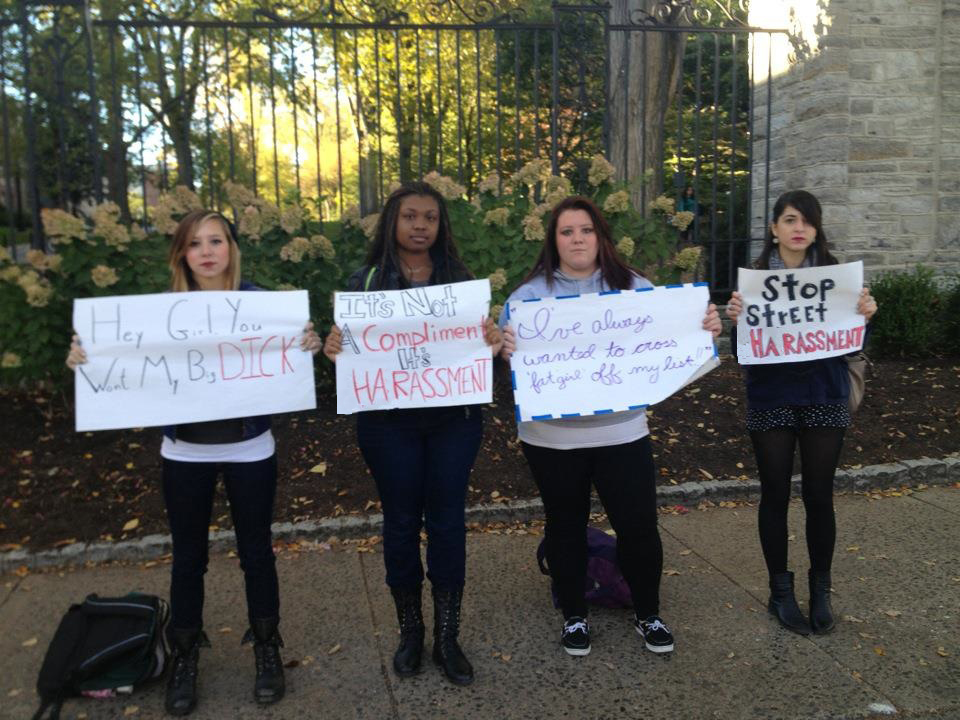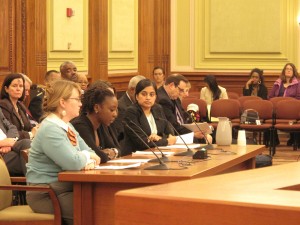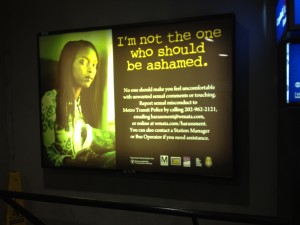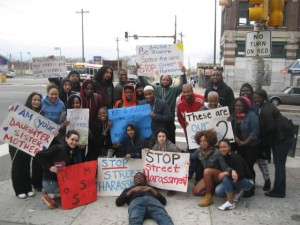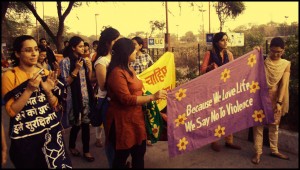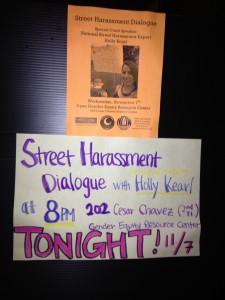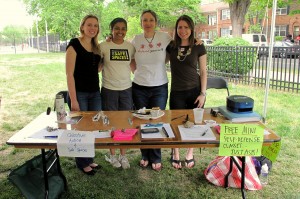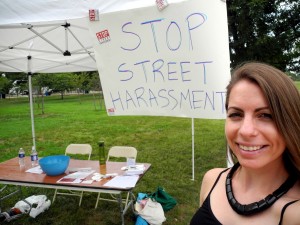At the end of every year, I like to look back, document and reflect on everything that has transpired in the global movement to end street harassment and assault. Yesterday I wrote about 10 of Stop Street Harassment’s achievements. Today, I’m posting a five-part series about the highlights of ALL activism that happened this year (PDF format). WHAT A YEAR!
Post 1: New anti-street harassment campaigns, new initiatives within existing campaigns, and protests.
Post 2: Creative anti-street harassment initiatives.
Post 3 (this one): Government initiatives/collaborations
Post 4: New studies, reports, and significant news articles.
Post 5: Stories from 25 people who stood up to street harassers this year.
1. Global: In May, municipal authorities from cities around the world met in Nairobi, Kenya, to discuss how to make cities safer and more sustainable, particularly for women and children. This was the annual meeting of the five-year Safe Cities Global Programme, launched in 2010 by UN Women. It’s taking innovative approaches to making public spaces safer in five pilot cities: Cairo in Egypt; New Delhi in India; Quito in Ecuador; Port Moresby in Papua New Guinea and Kigali in Rwanda. Studies conducted in 2011 by UN Women in these five cities showed that many women and girls experience sexual harassment or violence in public spaces on a daily basis.
2. Global: Various Hollaback! leaders met and worked with government officials to address street harassment, including Hollaback! Gwynedd, Wales, Hollaback! Edinburgh, Hollaback! Brussels, AtreveteDF (Mexico City), Hollaback! Philly, and Hollaback! New York. (Read their State of the Streets 2012 report for more information.)
3. Belgium: Over the summer, college student Sofie Peeters’ documentary about street harassment went viral, launching an international discussion about the topic and leading the government of Brussels to pass legislation addressing it.
4. Bolivia: Because of many women involved in politics in Bolivia report harassment at public events and in public spaces, Bolivia’s Legislative Assembly approved the Law against Harassment and Political Violence against Women. UN Women: “The new law provides a two to five year prison sentence for anyone who pressurizes, persecutes, harasses or threatens an elected woman or those exercising public functions. The penalty for practicing physical, psychological or sexual aggression is three to eight years in prison.”
5. Egypt: In a country where very few street harassers are punished through the court system, many people celebrated with a Cairo court sentenced a man to a two-year prison term as well as a LE2,000 ($330) fine for grabbing a young woman’s bottom while she was waiting for a cab.”
6. Europe: Twenty-five members of the Council of Europe have now signed the “Council of Europe Convention on preventing and combating violence against women and domestic violence,” which was written in April 2011. (See which countries have already signed it.)
Countries that sign the Convention agree to pass legislation or criminalize or impose sanctions against different types of gender violence, including domestic violence, honor killings, stalking, and sexual harassment. Here’s the exact language about sexual harassment, which presumably includes street harassment since it does not say the sexual harassment must occur in workplaces or schools:
“Parties shall take the necessary legislative or other measures to ensure that any form of unwanted verbal, non-verbal or physical conduct of a sexual nature with the purpose or effect of violating the dignity of a person, in particular when creating an intimidating, hostile, degrading, humiliating or offensive environment, is subject to criminal or other legal sanction.”
In order to enter into force, it needs 10 ratifications and it does not yet have them.
7. India: In Uttar Pradesh’s Meerut town, the police started posting photos of street harassers as a way to shame them and deter future harassment incidents.

8. India: In Madhya Pradesh, the Chief Minister announced in November that anyone found guilty of street harassment would be denied a passport and driver’s license.
9. India: In Guwahati, the police force introduced a special all-women division in November called Virangana to focus on street harassment and assault. The 100 women were specially trained and carry swords.
10. India: In November, India’s Supreme Court acknowledged that sexual harassment is a rampant problem, especially on the streets and on public transportation, and one that negatively impacts the lives of the harassed persons. So the Supreme Court issued a country-wide standard for addressing the problem.
11. Russia: This year the feminist group RosNahal tackled street harassment. They made a video about it and engaged in lobbying and activism that has led the Russian government to take notice. “Russia’s ruling party has decided that Russia needs a separate article prosecuting sexual harassment in its administrative code while the logistics for enforcing and proving such offences are still up in the discussion. Russia’s ruling party has suggested a steep fine of up to 50,000 rub which is about 1,000£ to punish any would-be sexual harassers.”
12. Saudi Arabia: The Shura Council in Saudi Arabia finalized the draft of an anti-sexual harassment.
 13. UK: The Ending Violence Against Women Coalition successfully pressured several of the candidates who ran for mayor of London in May to put street harassment on their agenda, but sadly, none of those candidates were elected.
13. UK: The Ending Violence Against Women Coalition successfully pressured several of the candidates who ran for mayor of London in May to put street harassment on their agenda, but sadly, none of those candidates were elected.
14. USA: After unsuccessfully trying to meet with the transit authority in Washington, DC, to discuss sexual harassment on their system, I joined a small group of people and testified about the problem before the Washington, DC City Council in February (the team was led by Collective Action for Safe Spaces). Ward 4 City Council Member Muriel Bowser was disturbed by the stories and statistics and told the transportation authority to do something! Two weeks later, they had formed a taskforce and got to work changing how they track and respond to harassment complaints, creating an online reporting form, and launching a poster campaign.
15. USA: At the urging of Collective Action for Safe Spaces and Stop Street Harassment, in Washington, DC, Ward 4 City Council Member Muriel Bowser introduced legislation that will make it easier to prosecute people who expose themselves in public (e.g. public masturbators and flashers). It is still pending.
16. USA: New York is considering a bill that would make harsher punishments for engaging in unwanted sexual touching in public spaces.


